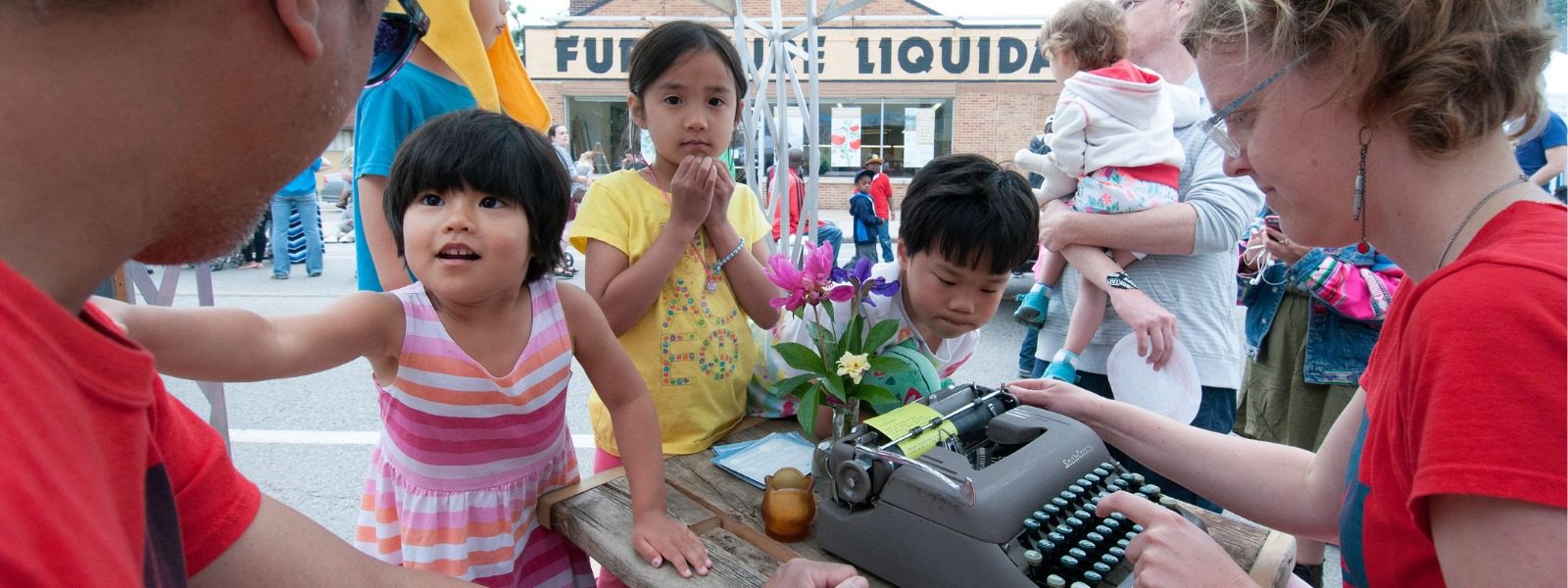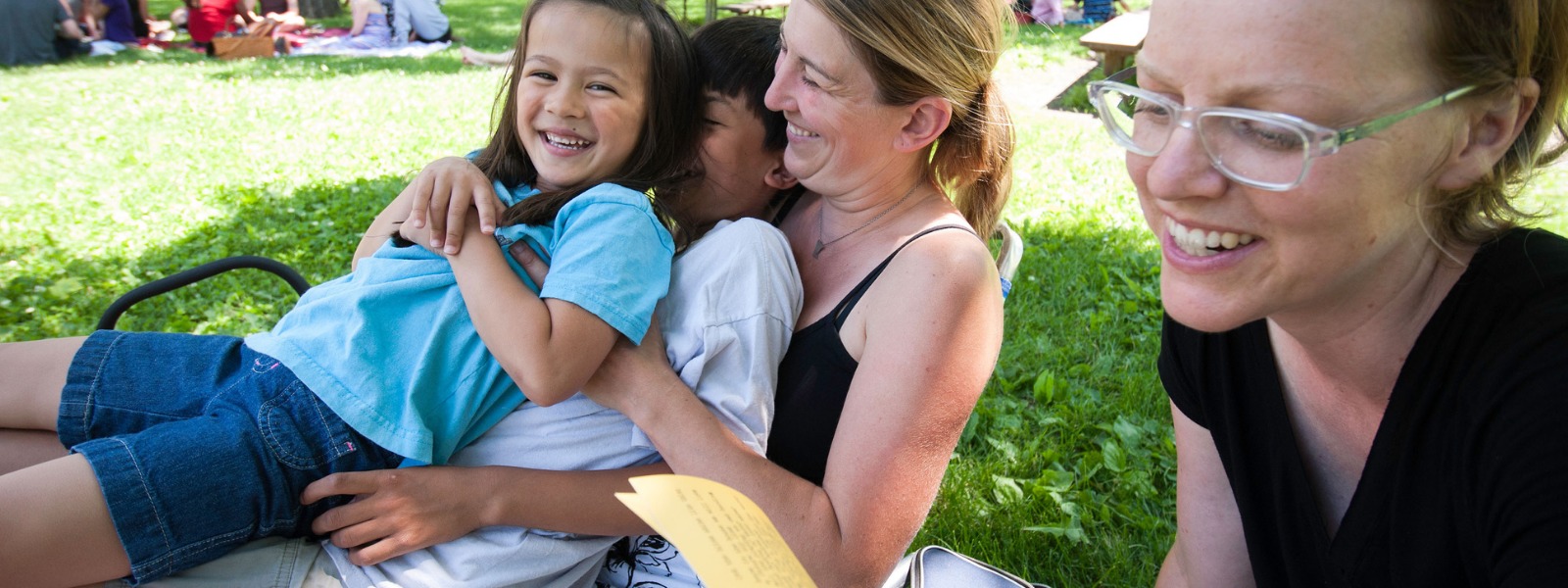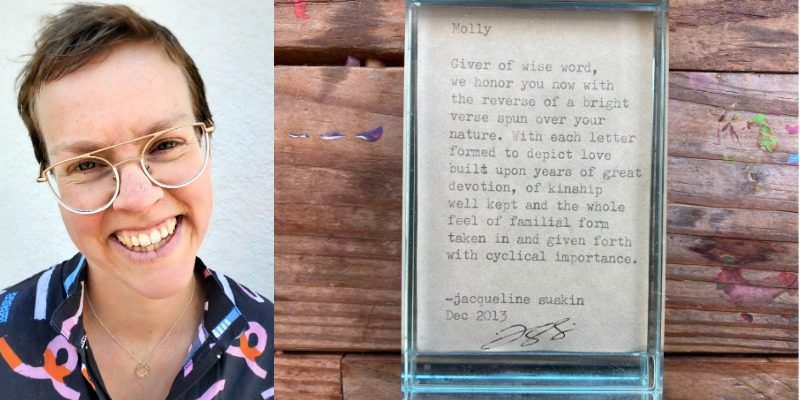As we mark the one year anniversary of the COVID-19 pandemic in the United States, Spark & Stitch Institute is thrilled to launch the Family Poetry Project in collaboration with partner poet Diver Van Avery. I sat down with Diver over Zoom to ask her questions about parenting, poetry, and what she can offer families during this time. Enjoy the interview and then learn more about the project and schedule a personalized poetry session for your family.
What compelled you to start offering “personalized poetry sessions” to people?
For almost fifteen years I have been writing each member of my immediate family their own annual poem. When we open presents on Christmas morning, the last thing we do is for each person to open that year’s poem and reads it aloud. We all cry or laugh, but mostly cry. I love writing them and am always truly inspired by my love for my family and my perspectives on what their year has been. Because of this tradition, my moms stopped at a special booth at a Los Angeles Farmer’s Market where a poet was writing poems on the spot for people. They asked her to write about me, and I received a poem that was about the circular nature of giving and receiving. That poem has been on my desk for almost eight years now. I love it and feel like it is a kind of mission statement for me. Five years ago, I wondered if I could do what she did. I started writing poems for people through a project funded by a community arts center, Pillsbury House Theatre on a mobile Poetry Mobile that I commissioned. The Poetry Mobile was a 1981 golf cart that got transformed into an outdoor writing studio. I took it to community gatherings, art fairs, and just around my neighborhood and found that I was able to create poems for people after short conversations with them and that the practice fueled me and moved others. I have been writing poems for people ever since!
Can you describe what a session is like?
I prepare for a session by quieting my whole system. I breathe and slow myself down. The person who calls me is sometimes nervous because they don’t exactly know what to expect. I explain what will happen, and try to remember to say that it’s normal to feel really emotional. Sometimes the conversations get really deep, really fast. Other times they stay more straightforward…there isn’t a right or wrong. I start with a really broad question like, “What are you holding right now?” If it is a poem for a family, I might ask, “How are you all doing?” I look for details, listen for specifics, and focus my questions while being encouraging, open, and affirming. What I am really looking for in the space between me and whom I am talking to is a first line. As soon as I get a first line, I tell them I am putting the phone down on speaker and ask them to stay reflective, spending the time listening to the typewriter and sitting with all they told me and all that was left unsaid. The poem often flies out of me. I am really channeling, quieting my own mind, getting out of the way, and allowing the words that are around the person come through. It’s not really about me or my own writing abilities. It is about discovering the poem that lives in and around the people I am writing it for. I am really just making space for their poem to arrive through my tools. I often cry when I read the poem to them. It is as moving for me as it is for the recipient/s.

You are both a parent and an artist… What has poetry offered you during this pandemic year?
Yes, I am a single parent, by choice, of a three year old. This year has been…I don’t have words for it yet, honestly. I live in Minneapolis a few blocks from where George Floyd was murdered. Living alone with my daughter while the city I loved expressed its rage and grief through protest, losing my childcare, grappling with my own identity as a white anti-racist activist, and profoundly missing my community…it pushed me into depths I have never encountered. I was not only lonely, I was burning with a desire to participate and contribute while also working with the meaningful responsibility of nurturing my child because I was really the only other person in her world for almost six months. Our lives shrank to our home to keep me from becoming sick to make sure I stayed the healthy adult she needed me to be. It occurred to me that I could offer my poetry. There is a powerful connection that comes with physical presence. I did not know if the magic of this personalized poem practice would “work” over the phone. But I knew I needed to try. I got a grant from Forecast Public Art to offer free poems for people to send to people they missed two months into the shelter in place orders and called that project Shelter in Poetry. Then I worked with a library system to offer poems for people thanks to creative librarians that were finding ways to stay connected to their communities while their library branches were closed. After that, I was able to contract with Shakopee Women’s Prison and wrote poems for people who were in jail. Over the course of the pandemic, I have written over three hundred poems to people. These conversations have grounded me, moved me, and given my life in covid significant purpose. Mostly, they have allowed me to connect with others, reaching out and across our isolation to find one another.
Through your personalized poetry sessions, you have had a unique window into people’s experiences a time of significant isolation. What has been most meaningful to you about these sessions?
The most meaningful thing that has been so clear in all of my sessions is the incredible power of love. When individuals asking for a poem for themselves, the poem is an act of self love. When people ask me to write a poem for their partner, for their parent, for their children, for their best friend, or for whomever, I get to listen to them speak directly from their heart. Love is the foundation from which all things emerge. What has moved me again and again is how many people ask me to write a poem for someone they have been living with. These are people who share the same space with each other day in and day out and these poems have been a way for the person to express their affection, respect, and deepest thanks to their presence. Finally, for me it has been incredible to listen to how hard this has been for people. I know it has been so difficult for me, full of break through and a growing sense of what I am capable of…but also just hard. To have a chance for people to express the difficulty without judgement or shame, and then to receive a poem that mirrors that challenge back with beauty and insight…these poems have helped me know that it is not only good, it is essential to look at the hard parts and create from them, not despite them.
You have your own young child and you have engaged lots of kids in these sessions. What do you think poetry means for kids? Their parents?
I think kids get poetry on its most fundamental level. Poetry breaks rules, whittles everything down to essentials, experiments with what is possible, and is just juicy and textured and sparkly. They haven’t learned to be intimidated by it, and I think they love the permission poetry gives to be free. I wrote a poem for myself based on a moment when my kiddo looked up at me and said “I’m never gonna lost you.” She wrote a poem on the spot, too. Recently, I wrote a poem for a family who wrote me a week after receiving their poem and sent me a picture of the family poem their daughter had written called “Family of Us.” I wrote them and said to tell her to keep writing because poetry makes the world go around. And I believe it does.
learn more about the project and schedule a personalized poetry session for your family.

